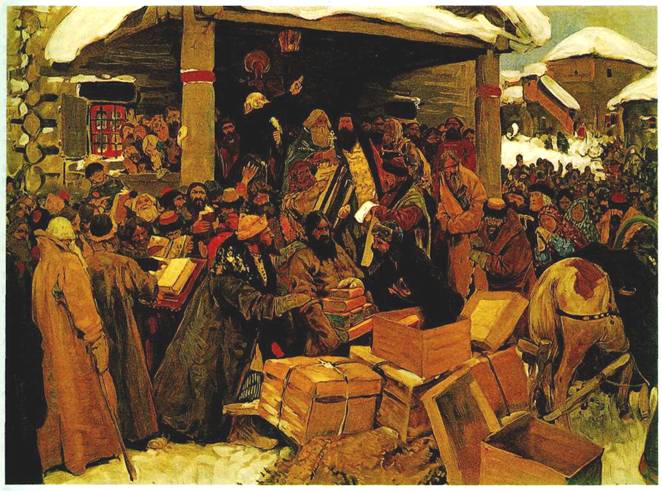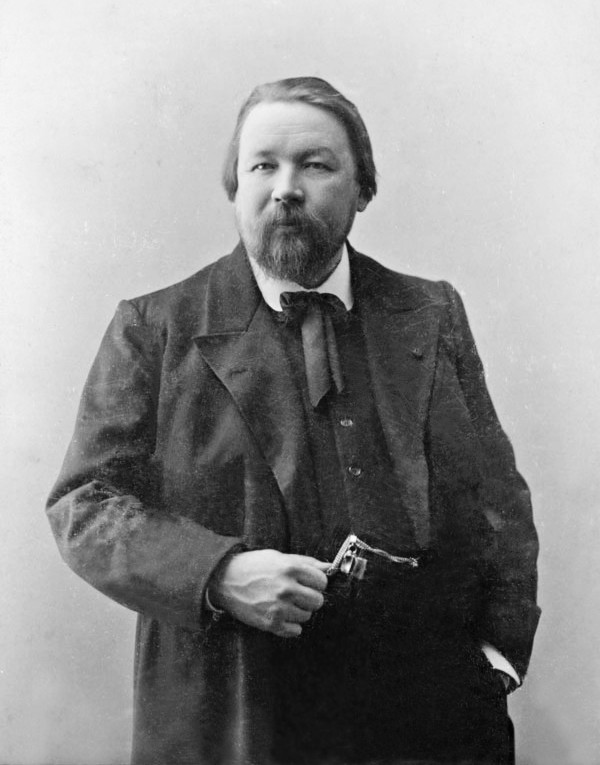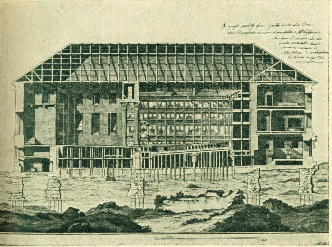|
A Profitable Position
''A Profitable Position'' (''Dokhodnoye mesto'', Доходное место) is a play by Alexander Ostrovsky. It was first published in No.1, January 1857 issue of '' Russkaya Beseda'' and came out as a separate edition later that year. Banned from being produced at the Russian Imperial theatres, it was premiered only six years later, on September 27, 1863, in Saint Petersburg's Alexandrinsky Theatre as a benefice for actress Elizaveta Levkeyeva. On October 14 of the same year it was performed in Maly Theatre, as actress Ekaterina Vasilieva's benefice. History Ostrovsky wrote ''A Profitable Position'' at his Moscow home, lying there with a broken leg after the incident during his Volga trip. Taking bribery and corruption as its themes, the play was eagerly anticipated by ''Sovremennik'' and its followers, but it was not a straightforward social critique. According to biographer Lakshin, Ostrovsky's approach was now different: "Is it worthwhile to wage ardent wars against certain ... [...More Info...] [...Related Items...] OR: [Wikipedia] [Google] [Baidu] |
Aleksander Ostrovsky
Alexander Nikolayevich Ostrovsky (russian: Алекса́ндр Никола́евич Остро́вский; ) was a Russian playwright, generally considered the greatest representative of the Russian realistic period. The author of 47 original plays, Ostrovsky "almost single-handedly created a Russian national repertoire." His dramas are among the most widely read and frequently performed stage pieces in Russia. Biography Alexander Nikolayevich Ostrovsky was born on 12 April 1823, in the Zamoskvorechye region of Moscow, to Nikolai Fyodorovich Ostrovsky, a lawyer who received religious education. Nikolai's ancestors came from the village Ostrov in the Nerekhta region of Kostroma governorate, hence the surname. Later Nikolai Ostrovsky became a high-ranked state official and as such in 1839 received a nobility title with the corresponding privileges. His first wife and Alexander's mother, Lyubov Ivanovna Savvina, came from a clergyman's family. For some time the family lived in ... [...More Info...] [...Related Items...] OR: [Wikipedia] [Google] [Baidu] |
Sovremennik
''Sovremennik'' ( rus, «Современник», p=səvrʲɪˈmʲenʲːɪk, a=Ru-современник.ogg, "The Contemporary") was a Russian literary, social and political magazine, published in Saint Petersburg in 1836–1866. It came out four times a year in 1836–1843 and once a month after that. The magazine published poetry, prose, critical, historical, ethnographic and other material. ''Sovremennik'' originated as a private enterprise of Alexander Pushkin who was running out of money to support his growing family. To assist him with the magazine, the poet asked Nikolai Gogol, Pyotr Vyazemsky and Vladimir Odoyevsky to contribute their works to the journal. It was there that the first substantial assortment of Fyodor Tyutchev's poems was published. Soon it became clear that Pushkin's establishment could not compete with Faddey Bulgarin's journal, which published more popular and less demanding literature. ''Sovremennik'' was out of date and could not command a paying aud ... [...More Info...] [...Related Items...] OR: [Wikipedia] [Google] [Baidu] |
Vasily Botkin
Vasily Petrovich Botkin (russian: link=no, Васи́лий Петро́вич Бо́ткин; – ) was a Russian essayist, literary, art and music critic, translator and publicist. Early life Vasily was born in Moscow, the son of Alexandra Antonovna (Baranova) and Petr Kononovich Botkin, a wealthy tea merchant. His brothers were Sergey Botkin, a well-known physician, and Mikhail Botkin, a painter and art collector. Vasily was a moderate liberal in the 1830s and 40s, associating with members of the circle of Nikolai Stankevich, and with the Westernizers, including Mikhail Bakunin, Vissarion Belinsky and Alexander Herzen. Vasily was a man of expensive tastes, a connoisseur of art and music, and a Polyglot (person), polyglot. He travelled widely in Europe, meeting well known figures such as Karl Marx, Louis Blanc and Victor Hugo. Career Vasily was the first Russian publicist to acquaint Russian readers with the works of Friedrich Engels (he wrote a summary of Engels's pamphlet ... [...More Info...] [...Related Items...] OR: [Wikipedia] [Google] [Baidu] |
Nikolai Chernyshevsky
Nikolay Gavrilovich Chernyshevsky ( – ) was a Russian literary and social critic, journalist, novelist, democrat, and socialist philosopher, often identified as a utopian socialist and leading theoretician of Russian nihilism. He was the dominant intellectual figure of the 1860s revolutionary democratic movement in Russia, despite spending much of his later life in exile to Siberia, and was later highly praised by Karl Marx, Georgi Plekhanov, and Vladimir Lenin. Biography The son of a priest, Chernyshevsky was born in Saratov in 1828, and stayed there until 1846. He graduated at the local seminary where he learned English, French, German, Italian, Latin, Greek and Old Slavonic. It was there he gained a love of literature. At St Petersburg University he often struggled to warm his room. He kept a diary of trivia like the number of tears he shed over a dead friend. It was here that he became an atheist. He was inspired by the works of Hegel, Ludwig Feuerbach and Charles ... [...More Info...] [...Related Items...] OR: [Wikipedia] [Google] [Baidu] |
Raskolniks
The Schism of the Russian Church, also known as Raskol (russian: раскол, , meaning "split" or "schism"), was the splitting of the Russian Orthodox Church into an official church and the Old Believers movement in the mid-17th century. It was triggered by the reforms of Patriarch Nikon in 1653, which aimed to establish uniformity between Greek and Russian church practices. Church reforms and reaction to them The members of an influential circle called the Zealots of Piety (Russian: Кружок ревнителей благочестия, ''Kruzhok revnitelei blagochestiya'') stood for purification of Russian Orthodox faith. They strove to reform Muscovite society, bringing it into closer accordance with Christian values and to improve church practices. As a consequence, they also were engaged in the removal of alternative versions and correction of divine service books. The most influential members of this circle were Archpriests Avvakum, Ivan Neronov, Stephan Vonifat ... [...More Info...] [...Related Items...] OR: [Wikipedia] [Google] [Baidu] |
Leo Tolstoy
Count Lev Nikolayevich TolstoyTolstoy pronounced his first name as , which corresponds to the romanization ''Lyov''. () (; russian: link=no, Лев Николаевич Толстой,In Tolstoy's day, his name was written as in pre-reformed Russian. ; ), usually referred to in English as Leo Tolstoy, was a Russian writer who is regarded as one of the greatest authors of all time. He received nominations for the Nobel Prize in Literature every year from 1902 to 1906 and for the Nobel Peace Prize in 1901, 1902, and 1909; the fact that he never won is a major controversy. Born to an aristocratic Russian family in 1828, Tolstoy's notable works include the novels ''War and Peace'' (1869) and ''Anna Karenina'' (1878), often cited as pinnacles of realist fiction. He first achieved literary acclaim in his twenties with his semi-autobiographical trilogy, ''Childhood'', '' Boyhood'', and ''Youth'' (1852–1856), and '' Sevastopol Sketches'' (1855), based upon his experiences in ... [...More Info...] [...Related Items...] OR: [Wikipedia] [Google] [Baidu] |
Ivan Panaev
Ivan Ivanovich Panaev (russian: link=no, Ива́н Ива́нович Пана́ев; March 27, 1812 – March 2, 1862) was a Russian writer, literary critic, journalist and magazine publisher. Early life Panaev was born into a gentry family in St Petersburg.Handbook of Russian Literature, Victor Terras, Yale University Press 1990. He graduated from the Boarding School for the Nobility at Saint Petersburg State University in 1830. He began publishing his works in 1834. His first romantic novellas included ''The Bedroom of a Society Woman'' (1834, published 1835) and ''She Will Be Happy'' (1836).The Great Soviet Encyclopedia, 3rd Edition (1970–1979). He married Avdotya Bryanskaya in 1837. Avdotya became a well-known writer and memoirist. Career Panaev became acquainted with Vissarion Belinsky in 1839; their friendship significantly influenced Panaev's literary career. Between 1839 and 1846 his works were published in ''Otechestvennye Zapiski''. They included the novellas ''Th ... [...More Info...] [...Related Items...] OR: [Wikipedia] [Google] [Baidu] |
Mikhail Ippolitov-Ivanov
Mikhail Mikhailovich Ippolitov-Ivanov (russian: Михаи́л Миха́йлович Ипполи́тов-Ива́нов; 28 January 1935) was a Russian and Soviet composer, conductor and teacher. His music ranged from the late-Romantic era into the 20th century era. Biography He was born in 1859 at Gatchina, near St. Petersburg, where his father was a mechanic employed at the palace. His birth name was Mikhail Mikhailovich Ivanov; later he added Ippolitov, his mother's maiden name, to distinguish himself from a composer and music critic with an identical name ( Mikhail Ivanov). He studied music at home and was a choirboy at the cathedral of St. Isaac, where he also had musical instruction, before entering the St. Petersburg Conservatory in 1875. In 1882 he completed his studies as a composition pupil of Rimsky-Korsakov, whose influence was to remain strong. Ippolitov-Ivanov's first appointment was to the position of director of the music academy and conductor of the orc ... [...More Info...] [...Related Items...] OR: [Wikipedia] [Google] [Baidu] |
Alexandrinsky Theatre
The Alexandrinsky Theatre (russian: Александринский театр) or National Drama Theatre of Russia is a theatre in Saint Petersburg, Russia. The Alexandrinsky Theatre was built for the Imperial troupe of Petersburg (Imperial troupe was founded in 1756). Since 1832, the theatre has occupied an Empire-style building that Carlo Rossi designed. It was built in 1828–1832 on Alexandrinsky Square (now Ostrovsky Square), which is situated on Nevsky Prospekt between the National Library of Russia and Anichkov Palace. The theatre was opened on 31 August (12 September) 1832. The theatre and the square were named after Empress consort Alexandra Feodorovna. The building is part of the UNESCO World Heritage Site Historic Centre of Saint Petersburg and Related Groups of Monuments. It was one of the many theatres of the Imperial troupe. Dramas, operas and ballets were on the stage. Only in the 1880s, the theatre has become dramatic and tragedy filled. The premières of n ... [...More Info...] [...Related Items...] OR: [Wikipedia] [Google] [Baidu] |
Maly Theatre (Moscow)
Maly Theatre (, literally ''Small Theatre'' as opposed to nearby Bolshoi, or ''Grand'', opera theatre) is a theatre in Moscow, Russia, principally associated with the production of plays. Established in 1806Londre, Margot p. 307 and operating on its present site on the Theatre Square since 1824, the theatre traces its history to the Moscow University drama company, established in 1756. In the 19th century, Maly was "universally recognized in Russia as the leading dramatic theatre of the century", and was the home stage for Mikhail Shchepkin and Maria Yermolova. 40 of Alexander Ostrovsky's 54 plays premiered at Maly, and the theatre was known as The House of Ostrovsky.Londre, Margot p. 306 The Maly Theatre in Moscow and Alexandrinsky Theatre in Saint Petersburg "to a great extent determined the development of Russian theatre during the 19th and 20th century". Maly Theatre positions itself as a traditional drama theatre that produces classical heritage plays. For example, the 200 ... [...More Info...] [...Related Items...] OR: [Wikipedia] [Google] [Baidu] |
Saint Petersburg
Saint Petersburg ( rus, links=no, Санкт-Петербург, a=Ru-Sankt Peterburg Leningrad Petrograd Piter.ogg, r=Sankt-Peterburg, p=ˈsankt pʲɪtʲɪrˈburk), formerly known as Petrograd (1914–1924) and later Leningrad (1924–1991), is the second-largest city in Russia. It is situated on the Neva River, at the head of the Gulf of Finland on the Baltic Sea, with a population of roughly 5.4 million residents. Saint Petersburg is the fourth-most populous city in Europe after Istanbul, Moscow and London, the most populous city on the Baltic Sea, and the world's northernmost city of more than 1 million residents. As Russia's Imperial capital, and a historically strategic port, it is governed as a federal city. The city was founded by Tsar Peter the Great on 27 May 1703 on the site of a captured Swedish fortress, and was named after apostle Saint Peter. In Russia, Saint Petersburg is historically and culturally associated with t ... [...More Info...] [...Related Items...] OR: [Wikipedia] [Google] [Baidu] |
Russkaya Beseda
''Russkaya Beseda'' (russian: Ру′сская бесе′да, en, The Russian Colloquy) was a Russian literary magazine founded in Moscow, Russian Empire, in 1856 by Alexander Koshelev who remained its editor-in-chief until 1858, when Ivan Aksakov joined in as co-editor. The magazine was published on a bi-monthly basis and was belonged to the Slavophile movement; most prominent in it were the literature, science and criticism sections. ''Selskoye Blagoustroistvo'' (Agrarian landscaping) was added as a supplement in 1858–1859. ''Russkaya Beseda'' targeted for broad and mixed readership and but, frequently covered articles about the future of the Slavic peoples. Among the authors who regularly contributed to the magazine, were Sergei Aksakov, Vladimir Dal, Aleksey K. Tolstoy, Alexander Ostrovsky, Aleksey Khomyakov, Fyodor Tyutchev, Ivan Nikitin, Taras Shevchenko Taras Hryhorovych Shevchenko ( uk, Тарас Григорович Шевченко , pronounced without ... [...More Info...] [...Related Items...] OR: [Wikipedia] [Google] [Baidu] |








